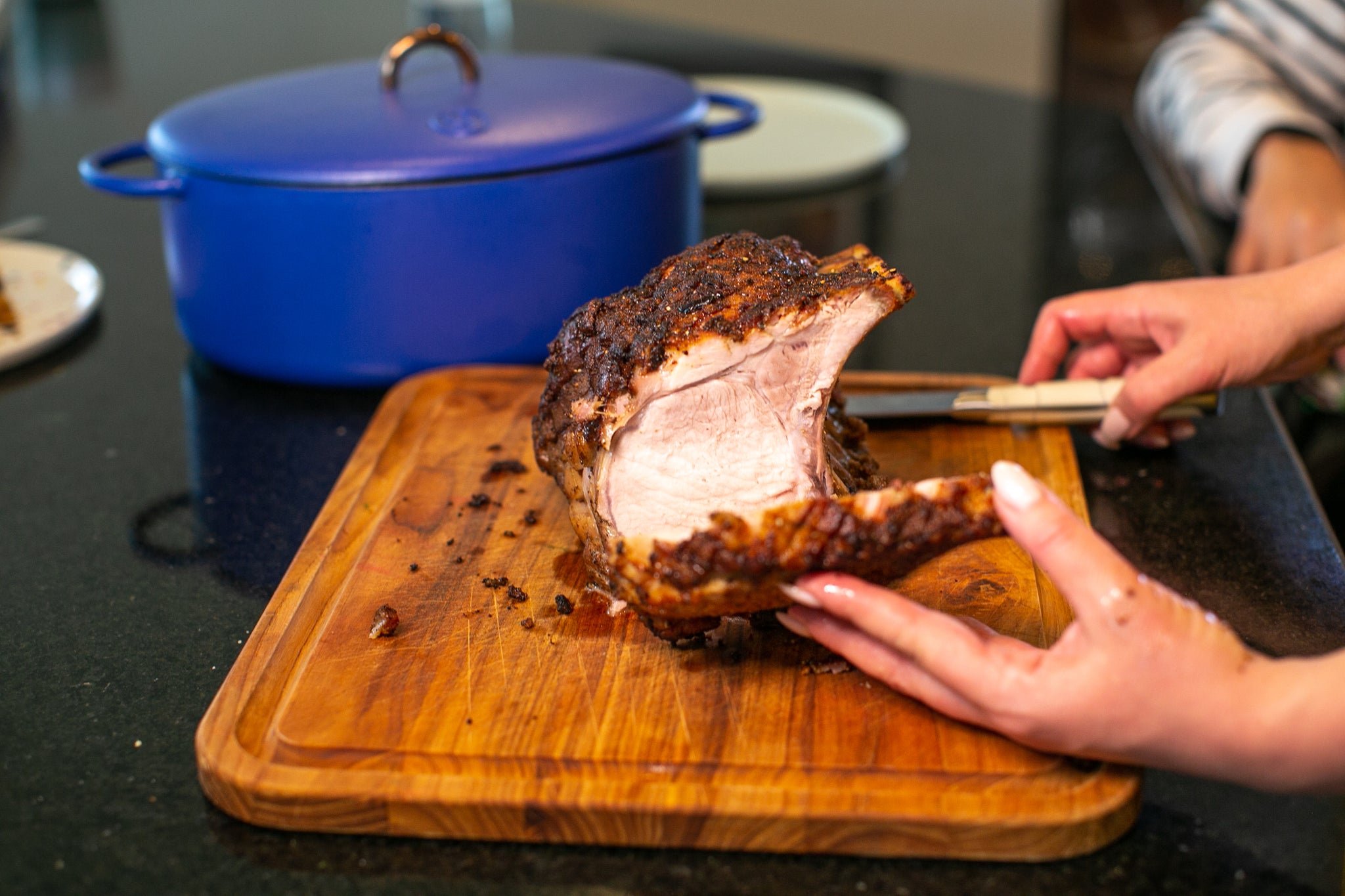Great Ones is a celebration of humans we admire — and an exploration of why they cook, not just how. Chef Eli Kulp started out as a busboy in a small town in Washington and went on to pursue a career in the fine-dining world that took him from the Pacific Northwest to New York City and, finally, to Philadelphia, where he has family roots. In 2015, Eli was left paralyzed after a devastating Amtrak train crash, which challenged his identity and independence to the core. We joined Eli at his home in Philadelphia to discuss his journey as a chef, all while making a spread inspired by Pennsylvania spring.
I never really had an interest in food as a child. Food wasn’t super important to my family and I grew up in a very small, rural town in Washington that had about 500 people. There was no real restaurant to go to, except for a McDonald’s that was an hour away.

There was no real restaurant to go to, except for a McDonald’s that was an hour away.
When I was 14, this woman decided to open a restaurant in our small town. It had tablecloths and linen napkins. It had all of the trimmings of a fancy restaurant. I got a job there as a dishwasher. I wanted to buy my own dirt bike, but we grew up pretty poor, so I had to work for it. I worked there as a busboy and was there for four years. When I graduated high school and left I was the head cook there. By then, I knew I wanted to cook. I don’t think I would’ve found cooking at all if it hadn’t been for that restaurant. Her moving there was the only thing that got me to cooking.

From culinary school, I took big steps toward higher-end dining. I worked in Portland fine-dining restaurants, and a friend of mine was going to take this position at this pub and asked me if I wanted to be the sous-chef. I was only 21 and had no business being a sous-chef, but there I was, second in command.

I enrolled in school, even though I didn't need to be in culinary school again. I studied chefs like Ferran Adrià. I didn’t go into that hypermodern food. I found another guy in NY who was doing modern French food. I did my internship there, and I was like, "Holy shit, I love it," and I was good at it. It gave me confidence.
I was like, "Holy shit, I love it," and I was good at it. It gave me confidence.

Within a couple of years I was the sous-chef at Del Posto; it was the temple of Italian gastronomy. I had come from French fine dining, working with guys who put you through so much shit. When I got to Italian food I was like, "Oh, you can cook food and not be mad?" I didn’t know you could cook great food and not be an asshole as a chef. There’s just a lot of care with Italian food. I always say, “You can’t cook Italian food angry.” If you’re mad, go cook up an Italian supper.
I always say, “You can’t cook Italian food angry.” If you’re mad, go cook up an Italian supper.

My buddies Rich Torrisi and Mario Carbone, who lead Major Food Group, took all of these classic Italian-American dishes and started looking at them through a different lens. We were like, "What would Grandma cook if she also loved hip-hop and Jamaica Ave?"
They blew up so fast, and I told them I would come on as chef de cuisine and help them build, but I wanted my own restaurant next. I learned so much from them. We were in this hyper-creative little world. We were challenging each other, but we all did it with love.

When I came down to Philly in 2012, I took the same perspective here. I’m not Italian American, but I’m Dutch — I’m Pennsylvania Dutch. My last name is a very Pennsylvania Dutch name, but I had never been to Philly. Coming down here, though, I was like, "This is where my family is; this is my heritage." My grandparents came to Washington from Pennsylvania. Their family was from Penn’s Landing, where I live now. It’s where everything started.
Coming down here, though, I was like, "this is where my family is; this is my heritage."
I thought, "Okay, I can take my Pennsylvania heritage and my background in fine dining, and tell a story." I was able to put that into a dish and tell a narrative. We put meaning behind the dish.

Okay, I can take my Pennsylvania heritage and my background in fine dining, and tell a story.
When I was younger, cooking was about exploring and experimenting. Everything you do is a reaction on a stove or in a pan. It’s all science, and it's exciting. So much of it is learning. I would be on my way to work in New York reading about cooking. I would devour Italian food books and understand all of the different regions. Now food is about connecting. It’s connecting with friends — getting my son to the table and having a conversation. It’s still about exploring but with different tastes and cultures. Everytime I go somewhere new, I learn something new.

Now food is about connecting. It’s connecting with friends — getting my son to the table and having a conversation.
After I got hurt I felt like I had to blame something. I looked at food and my career and the passion that drove me to want a restaurant in New York City and a restaurant in Philly, like this mini empire. That was my vision; I wanted to be where any of the great chefs were and for us at the restaurant to cook with both heart and mind.
After the accident, though, I lost my independence. I had to learn how to brush my teeth again, shower. My mind was good, but physically I couldn’t do anything. It was rough. At the same time, my marriage started to fall apart, which left me feeling hopeless. If it wasn’t for my kid and wanting to be there for him, I don’t know. He was only three and half, and for him it was cool I could ride around with him in the wheelchair — he wasn’t judging. I had to make it not about me. I had to shift my mentality and say, “This isn’t about me anymore — this is about him.” Like it or not, I had to show up and get on with it. I had to keep going.

If it wasn’t for my kid and wanting to be there for him, I don’t know. He was only three and half, and for him it was cool I could ride around with him in the wheelchair — he wasn’t judging.
Today, we took the perspective of taking in the region. The theme for the spread is a Pennsylvania spring. Each dish had a tie in with Philadelphia. First, a sunflower-seed risotto with saffron and mushrooms: sunflower seeds because they grow in Pennsylvania and saffron from my buddy in Pennsylvania who grows his own saffron. The Dutch brought saffron with them to Pennsylvania, so Pennsylvania saffron is a real thing. Then button mushrooms, which ties in with the local mushroom industry established here in the 1800s. I used Saucy for that, and it was the perfect pan for risotto.
The theme for the spread is a Pennsylvania spring. Each dish had a tie in with Philadelphia.

On Holy Sheet we made sausage and peppers and made that into a sausage-pepper casserole inspired by a sausage-and-pepper sandwich. We took pork sausage, peppers, and garlic and roasted them all up and made the casserole. We put that on a seeded semolina roll.

We did a roast pork in The Dutchess with spring onion and potatoes and broccoli rabe. Then we did provolone — the idea is that to the world the Philly cheesesteak is famous, but everyone in Philly knows the best sandwich to eat is roast pork, broccoli rabe, and provolone.

Then in King Sear we made a focaccia, which is very Italian, but married that with Italian pie, which is very Philly. We also made a blueberry crumble but used traditional flavors and Amish pretzels crumbled up as a topping.

But there’s optimism still.
It’s been a challenge these past few years, the industry is evolving at a rapid pace. The cost of labor and everything going up with sales going down. The pandemic affecting people getting sick and having to close the restaurant. It was chaos around the world but our industry is kind of a low man on the totem pole. There are still some restaurants that have been able to double their size and are benefiting. Other’s don’t have any outdoor space. It’s random who has gotten hit the hardest. But there’s optimism still. 






















